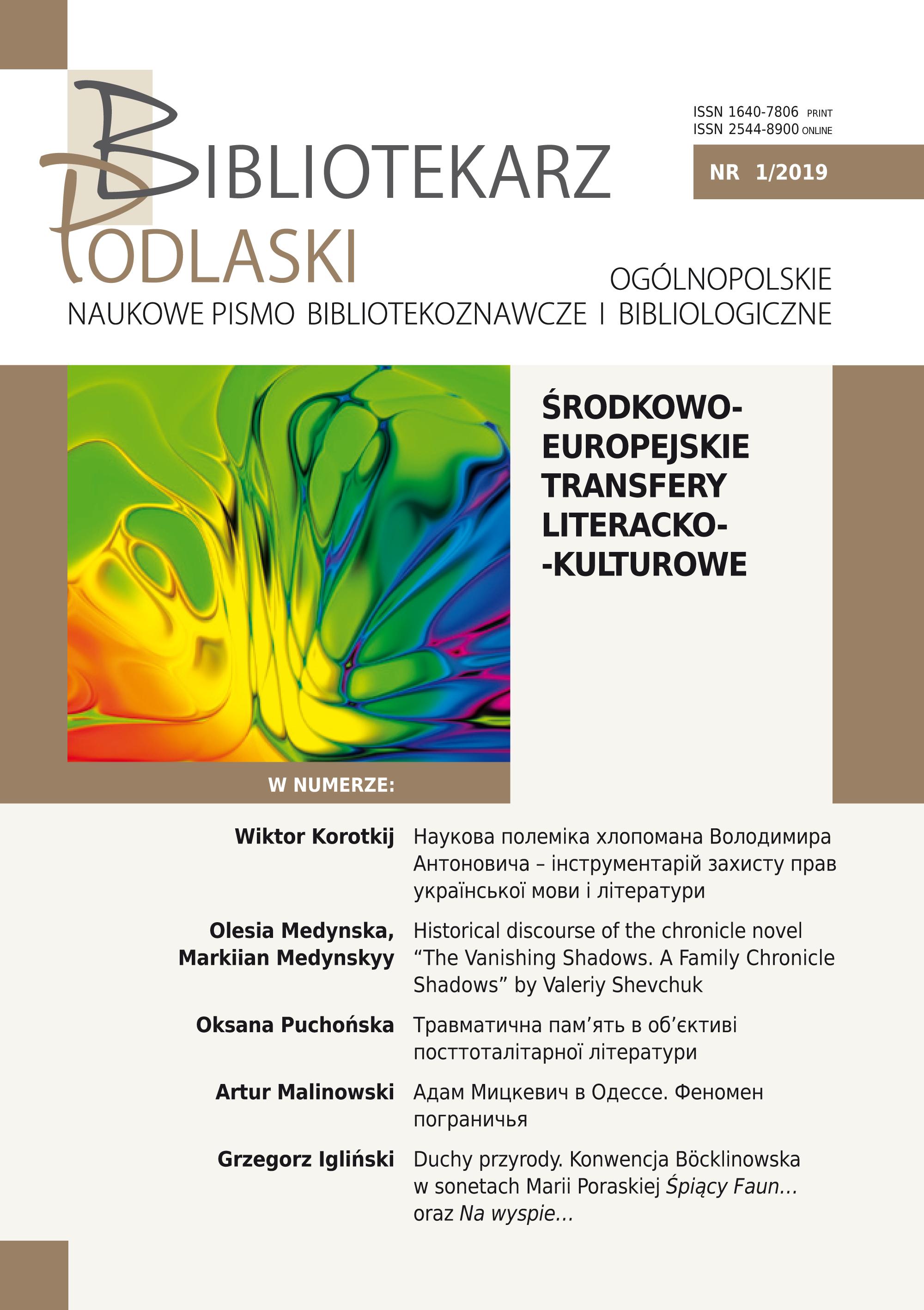Abstract
The present paper is concerned with the reception of Thomas Mann’s ‘The Magic Mountain’ in Paweł Huelle’s novel ‘Castorp’. In Thomas Mann’s ‘The Magic Mountain’ there is a passage which mentions in passing that the protagonist, Hans Castorp was a student in Danzig – he spent four semesters at the Danzig Polytechnic: “Long before his adventures in Davos, he had spent four semesters at the Danzig Polytechnic”. Intrigued by this line, the Polish writer Pawel Huelle was inspired to write a short novel ‘Castorp’, a kind of prequel to ‘The Magic Mountain’ – the author sets out to recreate the young man’s early adventures in the eastern outpost of the German empire, now the Polish port of Gdansk. ‘Castorp’ can be viewed as a kind of ‘mystification’, a ‘missing chapter’ of ‘The Magic Mountain’ intentionally reproducing narrative style of ‘The Magic Mountain’. Like Mann, Huelle weaves a skillful web of diverse cultural references, mathematical and musical abstractions, Schopenhauer’s philosophy, Schubert’s music, imaginary visions of the two world wars, shaping the polyphonic and contrapuntal structure of the novel.
References
Henseler D., Im Osten. Pavel Huelles Roman „Castorp“, „Literatur-Kritik“ 2005, nr 4.
Huelle P., Castorp, Gdańsk 2004.
Huelle P., Castorp, München 2005.
Huelle P., Kastorp, „Inostrannaja litieratura“ 2005, nr 6.
Jung W., „Der ewige, naive Idealist. Verschmitztes Spiel mit Thomas Mann“, „Frank- furter Rundschau“ [dostęp: 2.08.2005 r.].
Kakabadzie N. M., 1973, Tomas Mann, Tbilisi.
Kijowska M., Im Schatten des Zauberbergs, „Neue Züricher Zeitung“ [dostęp: 5.03.2005 r.].
Mann T., Der Zauberberg, Frankfurt am Main 1995.
Mann T., Einführung in den Zauberberg, [w:] Thomas Mann, Gesammelte Werke, Band 12, Berlin 1955.
Mann T., 1978, Volshebnaya gora. T. I. Tbilisi.
Mann T., 1984, Volshebnaya gora. T. II. Tbilisi.
Schmitz M., Zauberberg in Danzig, „Titel-Magazin“ [dostęp: 2.05.2005 r.].
Wysling H., Der Zauberberg, [w:] Thomas Mann Handbuch, Frankfurt am Main 2005.
Articles published in the “gold open access” mode on the basis of a non-exclusive license agreement between the publisher and the author. Permitted use:
- the publication may be read and stored on any device,
- the publication may be cited (with obligatory reference to the author, the title of the text, as well as the full title, bibliographic address of the issue and page of the journal)
The editorial team of “Bibliotekarz Podlaski” implements an open access policy by publishing materials in the form of the so-called Gold Open Access. From volume 42 (issue 1/2019), the journal is available under the Creative Commons license (Attribution – ShareAlike: CC BY-SA).
The key declarations of the Open Access and Open Science movement, which we fully support, are available on the CEON Open Science website.
COPYRIGHT:
The editorial team of “Bibliotekarz Podlaski” implements an open access policy by publishing materials in the form of the so-called Gold Open Access. The journal is available under the Creative Commons license – Attribution – ShareAlike 4.0: International: CC BY-SA 4.0).
The key declarations of the Open Access and Open Science movement, which we fully support, are available on the CEON Open Science website.
“Bibliotekarz Podlaski” allows its readers to read, download, copy, distribute, print, search and link to the full content of articles. We enable full, immediate, unlimited (both in a territorial, temporal and technical sense) open access to all published content, in accordance with the principle that freely available research increases and accelerates the global development of science and the exchange of knowledge.
The editorial team of “Bibliotekarz Podlaski” encourages authors to place articles published in the journal in open repositories (after the review or the final version of the publisher), provided that a link to the journal’s website is provided.
The journal does not charge the authors any fees for accepting and publishing their texts.


